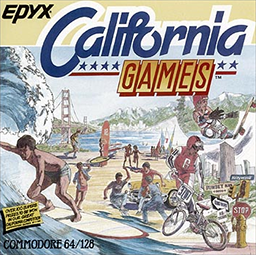
The Atari Lynx is a 16-bit handheld game console that was released by Atari Corporation in September 1989 in North America, and in Europe and Japan in 1990. It was the world's first handheld electronic game with a color LCD. It was also notable for its advanced graphics and ambidextrous layout. The Lynx competed with the Game Boy, as well as the Game Gear and TurboExpress, both released the following year. It was discontinued in 1996.

"Jabberwocky" is a nonsense poem written by Lewis Carroll about the killing of a creature named "the Jabberwock". It was included in his 1871 novel Through the Looking-Glass, and What Alice Found There, the sequel to Alice's Adventures in Wonderland. The book tells of Alice's adventures within the back-to-front world of Looking-Glass Land.

Through the Looking-Glass, and What Alice Found There (1871) is a novel by Lewis Carroll and the sequel to Alice's Adventures in Wonderland (1865). Alice again enters a fantastical world, this time by climbing through a mirror into the world that she can see beyond it. There she finds that, just like a reflection, everything is reversed, including logic Through the Looking-Glass includes such verses as "Jabberwocky" and "The Walrus and the Carpenter", and the episode involving Tweedledum and Tweedledee. The mirror which inspired Carroll remains displayed in Charlton Kings.
Splatbooks are sourcebooks devoted to a particular facet, character class, or fictional faction in a role-playing game, providing additional background details and rules options. For example, a "swords and sorcery" fantasy game might offer splatbooks for each of the races in the setting: humans, dwarves, elves, and others.

Jabberwocky is a 1977 British fantasy film co-written and directed by Terry Gilliam. It stars Michael Palin as a young cooper who is forced through clumsy, often slapstick misfortunes to hunt a terrible dragon after the death of his father. The film's title is taken from the nonsense poem "Jabberwocky" from Lewis Carroll's Through the Looking-Glass (1871).
"Jabberwocky" is an 1872 nonsense poem by Lewis Carroll, about an encounter between a young boy and a monster called the Jabberwock.

Sword of Fargoal is a 1982 video game by Jeff McCord, published by Epyx.

International Karate is a fighting game developed and published by System 3 for various home computers in 1985. Epyx licensed and released the game in the United States as World Karate Championship in 1986. International Karate + a successor which expanded the gameplay, was released in 1987, followed by the unauthorized release of International Karate + Gold in 2001.

California Games is a 1987 Epyx sports video game originally released for the Apple II and Commodore 64 and ported to other home computers and video game consoles. Branching from their popular Summer Games and Winter Games series, this game consists of a collection of outdoor sports purportedly popular in California. The game was successful for Epyx and spawned a sequel.

In mythology, legend or fiction, a magic sword is a sword with magical powers or other supernatural qualities. Renowned swords appear in the folklore of every nation that used swords.

The Movie Monster Game is a computer game released by Epyx for the Apple II and Commodore 64 in 1986. The game offers a variety of scenarios, playable monsters, and cities to demolish. The monsters are based on popular movie monsters such as The Blob, Mothra, the Stay Puft Marshmallow Man, and the Transformers, and Epyx was able to officially license Godzilla.
Jerold Wells was an English actor. He was born in Wallington, Hampshire, and died in Bath, Somerset.

The Problem Child is the third novel in The Sisters Grimm series written by Michael Buckley.

Jabberwocky, an adult pantomime by Andrew Kay, Malcolm Middleton and Peter Phillips, is a musical based on the English poem of the same name by Lewis Carroll.
The music, book and lyrics are by Malcolm Middleton, Andrew Kay and Peter Philips, with additional material by Robert Kay and by many members of the original cast.
Roy Evans, is an actor who has appeared in British Television from 1960s onwards, appearing in a wide range of productions including Doctor Who, Blake's 7, Porterhouse Blue, Only Fools and Horses, as well as peasant roles in The Black Adder.

Dragonriders of Pern is a 1983 video game published by Epyx that is based on Anne McCaffrey's book series of the same name. The game was released for the Atari 8-bit family and Commodore 64.
Kuroko's Basketball The Movie: Last Game is a 2017 Japanese animated film produced by Production I.G and distributed by Shochiku. This is the 1st film in the Kuroko's Basketball franchise, created by Tadatoshi Fujimaki. It was released in Japanese cinemas on March 18, 2017.










